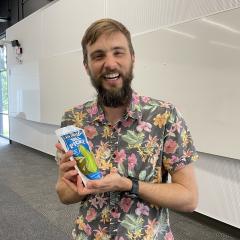Critical thinking is the Cheshire cat of educational curricula, appearing everywhere half formed but disappearing on close inspection. What is it, where is it and how is it taught to students?
Peter Ellerton shared his answer with panelists, teachers, and education professionals at the Developing Minds: Critical Thinking in Curriculum Transfer workshop. The workshop took place at Simon Fraser University, Canada, on 9 February 2018, and specifically focussed on how teaching critical thinking in K-12 classrooms could transfer into post-secondary education for student benefit.
In his plenary address, Peter proposes to conceive critical thinking by considering the relationship between three key components: cognitive skills, affective dispositions and the values of inquiry. Cognitive skills are the things we do with knowledge, such as infer, categorise, analyse, synthesis and so on. Affective dispositions are those things that are typical of critical thinkers, such as willingness to inquire, opens to new ideas, self-reflection, etc. The values of inquiry are those things applied during the process of inquiry, such as precision, clarity, plausibility, coherence and the like. Accepting this leads to certain pedagogical imperatives, principles that can be applied in any situation to guide the development and implementation of our assessment and learning experiences.
To develop expertise in teaching for thinking, teachers should consider two questions. The first is “What do you do in the classroom to focus on student thinking?” But such a focus on doing can lead to nothing more than mimicry and does not develop expertise. The second question, therefore, is “How does our thinking need to change so that we know what to do to focus on thinking?” Here is where the schematic nature of expert knowledge becomes of critical importance.
The workshop also hosted contributions by Mr Dale Martelli (Vancouver Technical Secondary), Dr Amy Parent (Simon Fraser University), Dr Jennifer Wong (Simon Fraser University), Dr Nicholas Fillion (Simon Fraser University), Ms Chas Desjarlais (Vancouver School Board), and Dr Natalia Gajdamaschko (Simon Fraser University).
Click here for the full program.


